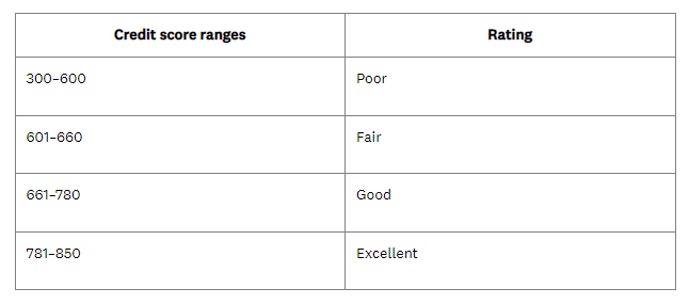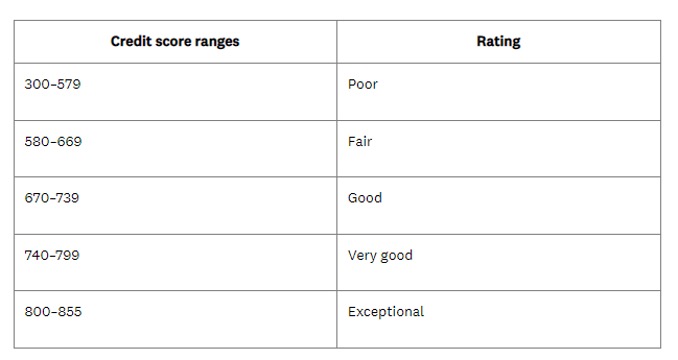A credit score numerically determines a person’s likelihood of repaying debt and ranges from 300 to 850. A higher credit score would mean that the borrower will pay the dues on time, and the probability of default would be significantly lower. Credit scores are considered to evaluate the creditworthiness of an individual. Lenders use a person’s credit scores to assign the borrowing’s interest rate, loan period, and credit limit.
People with a high score would find themselves in a favourable place for loan approval. In general, a person has a credit score that falls from 600 to 750. Having a good credit score guarantees the creditors that you would repay future obligations. Every lender has specific requirements that segregate favorable and unfavorable credit ratings.
Creditors’ requirements are also based on current events that directly impact an individual’s credit score. As a result, the requirements are prone to changes, if needed. To avoid all the hassle, some creditors have credit rating programs that determine the credibility of the individuals.
Most creditors use the FICO scoring model or the Vantage scoring model to check a person’s credit rating.
Why Is a Good Credit Score Compulsory?
If you have good credit, it helps you achieve your financial and personal goals more quickly.
It might mean the difference between being approved or denied a primary loan like a home mortgage or a car loan. A credit score is directly proportional to a person’s interest rate on their loan amount. Hence, if individuals have a good credit score, they will get a lower interest rate. Benefits of Having a Good Credit Score
It’s crucial to have good credit since it affects the decision for lenders to borrow your money or not and how much interest would apply to you.
These are some of the things you could get if you have a strong credit score:
- An unsecured credit card, a balance-transfer card, or a reasonable interest rate.
- A favorable loan on a car or property.
- A mortgage involving lower interest payment.
What Is FICO® Score Considered Good?
FICO generates many different credit scores for consumers. The score range of FICO is from 300 to 850, with FICO considering 670 to 739 to be an “excellent” score. According to the FICO scoring model concerning industries, the scores range from 250 to 900 points. The higher the points, the higher will be the credit score.
What Is Vantage Score?
In the previous Vantage scoring model, the scores fell in the radius of 501 to 990, but the model was updated to the latest algorithm that evaluated the credit scores. The new Vantage scoring model has a different scale that measures credit scores. Under this model, the scores fell in the radius of 300 to 850, where a score of 300 depicts the lowest credit score, and 850 depicts the highest credit score. People with a VantageScore from 661 to 780 are considered favorable for loan approval.
Credit score scale
For Vantage Score:

For FICO consumer:

Factors Affecting the Credit Scores
All of your credit ratings are affected by standard criteria, which are usually divided into five different classes:
- Payment history: Making payments on time on your credit cards will help you improve your credit scores.
- Credit usage: The factor considers the balance in all the accounts, debt owed by the individual, and the credit limit imposed on all the accounts.
- Credit history length: Under this category, an individual’s credit accounts are listed and averaged out, including their prior accounts, current accounts, and newly opened accounts.
- Account types: This deals with how a person manages installment and revolving accounts in terms of the borrowed loans, including credit cards. The factor evaluates that a person can effectively manage both accounts.
- Recent activity: This factor analyses whether you’ve applied for or opened new accounts in the last few months.
FICO® Score Factors
Although the specific percentage breakdown utilized to establish your credit score will depend on your unique credit report, FICO uses percentages to show how important each area is in general. The following weights are assigned when determining the credit score:
- Payment history is given 35% weight.
- Amounts owed has 30% weight.
- Length of credit history is 15% of the overall weight.
- The new credit and credit mix has 10% weightage for each of them.
Vantage Score Factors
VantageScore ranks the criteria in order of importance in determining a credit score, but this will change depending on your credit report. VantageScore takes into account the following factors:
- Extremely influential: Balance, total credit usage and available credit
- Highly influential: Experience and credit mix
- Moderately influential: Payment history
- Less influential: Age of credit history
- Less influential: New accounts opened
Which Things Are Not Considered?
FICO and Vantage scoring model does not take into account the following when evaluating the credit scores:
- The ethnic background and the religion that a person follows.
- Personal information like marital status, source of income and employment history.
- Age of the individual and place of residence.
The Reason for Different Credit Scores
Lenders use credit ratings as a tool for making loan choices. FICO and VantageScore models are responsible for improving the creditworthiness of people. Lenders widely use the models to assess the credibility of borrowers asking for loans and credit cards. The most recent versions may integrate technical advancements or changes in customer behavior and meet new regulatory requirements.
All the lenders widely use the FICO scoring model as a medium to assess people’s credit ratings. The model is one of the first to develop the idea for centralized credibility that most of the creditors accept. The FICO scores are segregated into two branches to better facilitate the individuals. They are:
- Base FICO Scores: These scores evaluate the probability that shows a customer will not be able to pay their dues on time. All lenders can avail of the service.
- FICO Ratings for Auto Lenders and Bankcard Issuers: FICO has developed a separate auto and bankcard scores category to accommodate auto lenders and card issuers. Industry ratings range from 250 to 900 and are used to assess the possibility of a customer defaulting on a specific type of account.
Scores are also employed on a more infrequent basis. FICO is introducing another feature called UltraFICO Score, enabling people to link all their accounts together to assist in the credit scoring analysis. Lenders can also construct unique credit scoring models tailored to their specific consumers.
Lenders can use any model they like. Shifting from an older version to a new model will incur costs and fees, so the lenders stick to the older versions as they are cost-effective. Many mortgage lenders also employ older versions of the underlying FICO Scores to comply with government-sponsored mortgage companies Fannie Mae and Freddie Mac’s criteria.
If you compare different credit scores, you may see that your results differ based on the scale your credit was measured with and which of your credit reports were examined.
Ways to Improve the Credit Scores
It is imperative to focus on those factors that assist in improving an individual’s credit scores. Some ways to do that include the following:
- Make on time payments and clear all forms of debt. Falling behind on dues and payments will negatively affect your credit scores, and it will be part of your credit report for many years. If you cannot make a payment, it is necessary to contact the creditors and ask them to give you some time if the situation is urgent and requires some time.
- Keep your credit balance in check. The credit limit imposed on your credit card is an imperative factor in evaluating your credit scores. The credit limit can be improved if a person has a low credit utilization rate. Those with a lower credit utilization rate find themselves on favorable terms with the creditors.
- Accounts with open balances will be reported to the major credit bureaus for evaluating credit scores. It is advisable to post all the accounts to credit bureaus to improve the credit score in the credit report. Some examples of such accounts include installment accounts that are further divided into student accounts, car loans, house loans, etc., and revolving accounts that consist of credit cards as loans.
- Don’t apply for credit without any needs. When opening a new account or applying for a loan, the individual would go through a hard inquiry on all their accounts, adversely impacting their credit scores. If a person applies to several new accounts or loans quickly, that will adversely impact their credit score.
A variety of other things influence your score. For instance, using your current accounts for longer would yield a better credit score than opening new accounts. A person can check their credit score from time to time to figure out the steps to improve the score if needed.
How to Get a New Credit Score
Credit scoring scales use your credit reports to calculate your score. However, they can’t evaluate reports with insufficient data.
To check your credit score on the FICO scoring model, a person needs to have the following:
- An account that is at least six months old from when it was initially opened
- An account that has been active for the last six months and is currently in use and goes through certain transactions.
In the case of the Vantage scoring model, the credibility of a person can be evaluated if the account is newly opened, but it should have at least one current account.
If a person wants to build their credit, it is advisable to create a new account and report all activities on that account to the credit bureaus. This will ensure that the account is active and considered scoreable.
Which Factors Could Change the Credit Score
The credit score can change due to several factors. If any new information is added to the account, it is directly reported to the credit bureaus to become part of the credit report.
Many factors can be a cause for the decrease in the overall credit score. For instance, falling behind on a payment like credit card bill, will negatively impact the credit score. Paying down a large credit card bill and lowering your utilization rate, on the other hand, may improve your credit score.
However, some acts may influence your credit ratings. Returning the money you owe as loan payment would improve the credit score.
A person has a choice to pay off the debt they owe and not avail of the company’s services any longer. Although having no debt at all is a positive sign, keeping the account inactive for long might make it dormant and negatively impact the credit score. So it is important to keep the account active and use it to pay for monthly subscriptions for e-commerce websites like Netflix or Amazon Prime. Using a credit card to pay for such services will show the account’s activity, and it will have a positive impact on the credit rating.
The credit scoring models use a different algorithm to predict the final result. It is important to note that your whole credit record determines the number of points you get or lose.
If a person who always pays his dues on time starts to pay them after the due date, this will also have negative repercussions as it will show a new adverse habit. This will add to the increased credit risk, keeping in view the abovementioned change.
Someone who has already missed several payments, on the other hand, may have a reduced point decrease from a new late payment because it is believed that they will continue to miss payments.
The Steps to Calculate Credit Scores
The exact formulas used by FICO® and VantageScore to calculate credit scores are trade secrets, but their models all work on the same data seen in your credit report—data that directly corresponds to your borrowing and repayment decisions.
The following factors are primarily used to evaluate the ScoreScore:
Prior payment record
The credit score moves towards a positive side when the bills and debt owed is paid on or before its due date. This is the single most crucial element, accounting for up to 35% of your FICO® ScoreScore.
The use of credit
It is advisable not to go beyond the 30% mark that corresponds to the overall credit limit that the user has at hand. This is carried out to ensure that credit score remains unharmed. Credit utilization, commonly known as your credit utilization rate, accounts for roughly 30% of your FICO® ScoreScore.
Credit history length
Over time, FICO scores tend to rise. While new credit users won’t speed up the process, establishing a track record of timely payments can help increase credit scores as their credit history grows. The weightage of credit history is 15% when evaluating the credit score.
A credit mix is essential
Your credit score reflects the total amount of debt you owe as well as the types of credit you use. Your credit mix can affect up to 10% of your FICO® ScoreScore.
Credit applications were made recently
Whenever a borrower asks for a loan from the lender, a hard pull is carried out on the borrower’s account history to determine their creditworthiness which is used to make a decision. Up to 10% of your FICO® ScoreScore can be attributed to recent credit applications.
Negative information
Depending on the nature of the material, specific credit report entries might significantly reduce credit scores for a prolonged period. FICO does not apply percentage weights to these items since they are not present in all credit reports; but, when they do occur, FICO considers them to be part of payment history. Although the bad influence of these entries fades with time, they can initially dominate all other factors and significantly lower your credit score.
Credit is evaluated using similar elements in VantageScore scoring models. Their relative importance is described as follows by VantageScore:
- Payment history is the most influential factor (paying bills on time)
- Age and kind of credit (creating a suitable mix of loan accounts); % of credit limit used is both highly influential (avoiding “maxing out” cards)
- Debt and total balances are moderately influential (limit debt to what is prudent).
- Recent credit conduct and queries (applying for new credit) are less influential; available credit is less influential (avoiding opening unneeded credit accounts)
Negative entries heavily influence VantageScore credit scores; however, the company’s most recent model, VantageScore 4.0, eliminates some collections accounts relating to medical debt.
While FICO® and VantageScore differ slightly in which aspects are most important, all credit scoring models attempt to identify responsible credit users. All of your credit scores will increase if you adopt and maintain healthy credit habits.
How to Make the Credit Score Better?
You want to have the most satisfactory credit score available if you will receive a loan or a credit card. There are a few things you can concentrate on if you want to raise your score:
- Timely payment of bills: One of the most crucial components of your credit score is on-time payment, so make sure you’re on top of any amounts you owe each month.
- Maintain low credit card balances: While it’s crucial to utilize your credit cards to demonstrate that you can pay them off, keep your balances modest. In general, you want your monthly balance to be less than 30% of your total credit limit.
- Limit the number of credit cards you have: Don’t sign up for new credit cards only to acquire a gift or because the offer appears to be too tempting to pass up. New cards should only be opened as needed.
- Correct inaccuracies on your credit report: Inaccuracies on your credit report could be lowering your score. Take care of them.
- Keep your credit card accounts open: It’s OK if you don’t use a card anymore, but don’t close the account. Simply place the card in a drawer.
There is no foolproof technique for increasing your credit card limit in a short period, so don’t believe anyone who tells you otherwise. Simply follow these broad guidelines and use common sense, and your score will improve over time.
Frequently Asked Questions
These are the frequently asked questions people ask with regards to credit score and credit score scale.
What credit score should a person have if they buy a car?
If you have a credit score below 700, an individual is going to be questioned about the times when they fell behind on payment(s).
Which credit score is considered ideal when buying a house?
A very good credit score is not required to mortgage a house. People with lower credit scores have failed to get a house with a reasonable interest plan.
Which credit score is considered ideal for apartment renting?
Landlords and property managers are not after a good credit score but rather a good history. So if a person has a good credit history, they will qualify for an apartment loan.
Is a credit score of 700 considered excellent for loans?
A credit score of 700 is considered a very good credit score consisting of favourable terms such as interest rate and interest period. A person will have a higher probability of being granted the loan in better terms, such as a cheaper interest rate.
What credit score is considered as good?
A good credit score falls between 720 to 850 on a scale of one to ten. Any score that falls in the abovementioned range will yield better rates and terms.
Which credit score is considered fair?
A fair credit score falls between the radius of 630 and 689.
Which credit score is categorized as bad?
Anyone with a credit score less than 630 falls in the radius of a bad credit score. You could use the suggestions given above to improve your credit score.
Summary
The credit scores fall between the range of 300 to 850 for anyone wishing to get their financial history checked by the major credit bureaus for loan approval from a creditor. Where you land on that scale can significantly impact your financial situation. It is important to pay the bills owed on time and keep the credit utilization as low as possible. On the other hand, experts believe that achieving a credit score of 850 is not the best use of your time. To get affordable rates on mortgages and other forms of financing, you don’t need a new credit score.
Experts advise that people check their credit scores before they are about to apply for new loans or accounts. This will help them understand their credit and take steps to improve their credit history. As a result, people will not have to pay high interest on the loans they borrow, which will save them a lot in finance.


